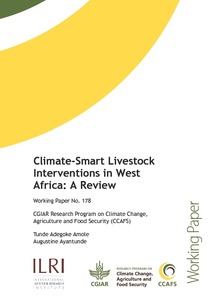Resource information
The livestock sector is one of the major contributors in agriculture, by some estimates
contributing up to 18% of the global greenhouse gas (GHG) emissions. Of this, about one
third is reported to be due to land use change associated with livestock production, another
one third is nitrous oxide from manure and slurry management, and roughly 25% is attributed
to methane emissions from ruminant digestion. Recent analysis suggests that developing
world regions contribute about two thirds of the global emissions from ruminants, with sub-
Saharan Africa a global hotspot for emissions intensities, largely due to low animal
productivity, poor animal health and low quality feeds. These numbers suggest, therefore, that
there are opportunities for easy gains to be made in terms of mitigation in the livestock sector,
as improving feed resource use efficiencies would improve livestock productivity as well as
reduce emissions per unit of product. In this context, climate-smart agricultural practices are
necessary in the West Africa region and in sub-Saharan Africa in general. Climate-Smart
Agriculture (CSA) is an approach that provides a conceptual basis for assessing the
effectiveness of agricultural practice change to support food security under climate change.
This review focuses on livestock-related CSA options in West Africa looking at herd
management, feed, grazing management, animal breeding strategies, manure management,
and policy options.


